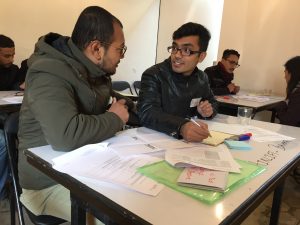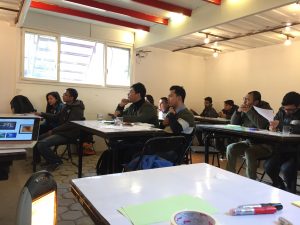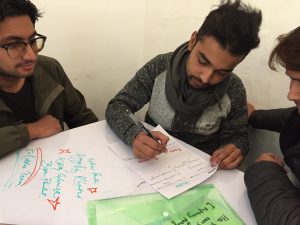After the successful completion of Year 1 of I-Cube, we are moving ahead with incubating our second cohort of 6 I-Cube teams. Our second cohort of I-Cube entrepreneurs are preparing to take industries by storm with their brilliant ideas. These driven young entrepreneurs have been receiving business and financial coaching, monthly masterclass workshops, and access and opportunities to make use of Nepal Communitere’s expansive networks.
One the 6 innovative companies is Sampurna Multipurpose. Sampurna is a company founded by generational shoemakers that have been historically marginalised. Leveraging their traditional craft, they are producing and selling leather goods and footwear, creating jobs for people in their own community.
 Many of our companies are led by entrepreneurs who are enthusiastic about the environment and sustainability, working very hard in developing their sustainable business model. Antidote Nepal is one of these sustainably-minded companies. Bearing in mind that the fashion industry is one of the largest contributors to pollution in the world, Antidote seeks to offer a sustainable and affordable option to Kathmandu’s fashion forward! Antidote is prototyping a cost-effective occasional wear rental service for women so that they can have easier access to affordable premium clothes. Similarly, Ecoorb Initiatives is also a sustainability focused business that uses elephant dung from Chitwan to manufacture and sell quality paper products. The focus is on refining the paper to make it of export quality, which can be written on smoothly.
Many of our companies are led by entrepreneurs who are enthusiastic about the environment and sustainability, working very hard in developing their sustainable business model. Antidote Nepal is one of these sustainably-minded companies. Bearing in mind that the fashion industry is one of the largest contributors to pollution in the world, Antidote seeks to offer a sustainable and affordable option to Kathmandu’s fashion forward! Antidote is prototyping a cost-effective occasional wear rental service for women so that they can have easier access to affordable premium clothes. Similarly, Ecoorb Initiatives is also a sustainability focused business that uses elephant dung from Chitwan to manufacture and sell quality paper products. The focus is on refining the paper to make it of export quality, which can be written on smoothly.
Nuga is another sustainably-minded company founded by Rasana and Suyesh Shrestha. The duo takes a mindful approach to producing chemical-free personal care products, working with food technicians to make sure all their products are edible-grade and natural. For Nuga, providing Nepali customers with safe products that don’t contain chemicals at an affordable price point is a passion.
 Our new cohort is also working on introducing tech-innovations in Nepal. E-Rickshaw is a group of mechanical engineering students are working on upgrading pedal rickshaws into electrically assisted rickshaws using their prototype E-kits. They are hopeful that by introducing this innovation in Kathmandu, they will help improve both health outcomes and earning capacity of rickshaw operators. Similarly, Airlift Techonology is also a company that’s sure to create some buzz. Airlift uses hi-tech drones to provide professional aerial mapping, 3D modelling and 360 image services to clients, helping them rebuild Nepal beyond the barriers of geographical and other constraints.
Our new cohort is also working on introducing tech-innovations in Nepal. E-Rickshaw is a group of mechanical engineering students are working on upgrading pedal rickshaws into electrically assisted rickshaws using their prototype E-kits. They are hopeful that by introducing this innovation in Kathmandu, they will help improve both health outcomes and earning capacity of rickshaw operators. Similarly, Airlift Techonology is also a company that’s sure to create some buzz. Airlift uses hi-tech drones to provide professional aerial mapping, 3D modelling and 360 image services to clients, helping them rebuild Nepal beyond the barriers of geographical and other constraints.
The entrepreneurs have expressed their drive and their passion to work on their startups and see them survive and thrive. They expect business development guidance, mentorship, and support from I-Cube so that they can realize their goals and their dreams.
 Year 1 of I-Cube was a learning experience for Nepal Communitere’s I-Cube team as well, and the team has been taking learnings from Year 1 and applying it to the year 2 cohort. Program officers Anil and Anita spoke of how they saw the mindset change of the the year 1 entrepreneurs, where they moved from being product and service driven, to think more broadly in terms of their markets and customer service. They are optimistic that learning how to change, iterate, and innovate their product according to the changing climate and according to new learnings is also something the second cohort will find beneficial. “After a year of trial and error, and repeated failings and learnings, we know what needs to be done”, said Anita.
Year 1 of I-Cube was a learning experience for Nepal Communitere’s I-Cube team as well, and the team has been taking learnings from Year 1 and applying it to the year 2 cohort. Program officers Anil and Anita spoke of how they saw the mindset change of the the year 1 entrepreneurs, where they moved from being product and service driven, to think more broadly in terms of their markets and customer service. They are optimistic that learning how to change, iterate, and innovate their product according to the changing climate and according to new learnings is also something the second cohort will find beneficial. “After a year of trial and error, and repeated failings and learnings, we know what needs to be done”, said Anita.
With more of a focus on building soft skills, and preparing them for seed funding, pitching, and general investments and accounts, this year’s cohort of entrepreneurs have a packed and intense 10 months. This year, there will also be more curated networking sessions that are more deliberate, and are facilitated to fit the need of the hour; this will make use of Nepal Communitere’s expansive networks and connections. Similarly, the I-Cube team will also be part of sessions on coaching and facilitating with NC director Bahar Kumar. According to Anita and Anil, these will be very useful as these businesses are very close to entrepreneur’s heart, and mentoring entrepreneurs with their business development requires a lot of trust and friendship.
There are different things to look forward to with this cohort: there’s innovation and there’s impact, and they’re strong entrepreneurs that are passionate and hungry and committed to their businesses. Bahar highlighted the importance of supporting these high-risk, early-stage entrepreneurs” “I-Cube fills a critical gap in Nepal’s entrepreneurial ecosystem, as it supports those are the highest risk and those most in need of support. The group of early stage startups is the group that needs the most growing if are to build Nepal’s entrepreneurial ecosystem; if we don’t support them, we will lose them.”
In 2018 we expanded into Kathmandu’s burgeoning entrepreneurship ecosystem, designing and launching a year long business incubation program called the I-Cube Program. Through the program, Nepal Communitere was able to graduate the I-Cube Program’s first cohort of 3 Nepali startups and 2 student engineering teams. in December 2018. They pitched their ideas at Demo Day 3 Nepali startups are brought seed investment to scale up their business. To make this possible we partnered with SAFAL Partners and Antarprerana, breaking new ground to create Nepal’s first ever seed fund: SAFAL Seed. With SAFAL Partners and Anterprerana, we were able to leverage our respective strengths and assets to achieve a common goal. Now, there is a platform for Nepalis to invest as individuals in promising Nepali entrepreneurs.